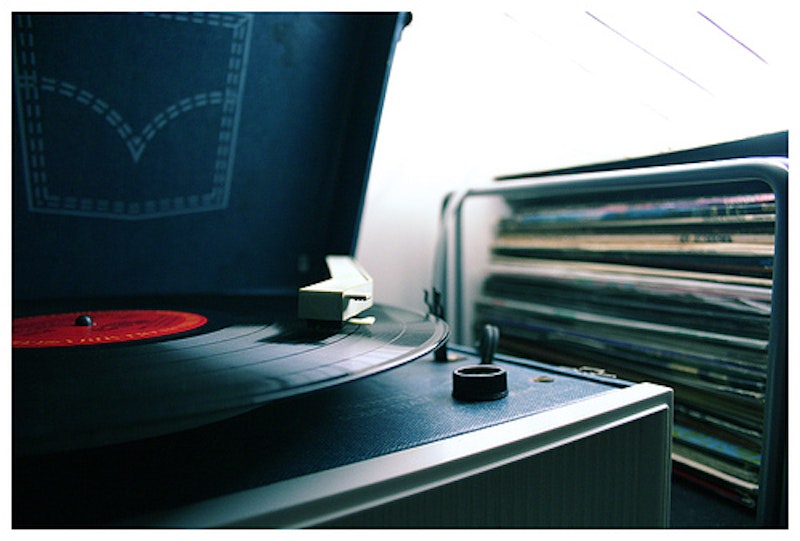Robert Christgau had been on the Village Voice payroll for over three decades when the weekly laid him off in 2006; he then moved on to Rolling Stone, where he was let go after a year, and then to Blender, where he worked until that magazine’s demise in 2009. That such a print-media notable would wobble in the current corporate environment is no surprise, but in Christgau’s case the fate seems almost cruel: his Consumer Guide, the 41-years-running compendium which he moved from the Voice to MSN.com before ending last week, was, as people are already noting, a kind of critical precursor to Twitter.
But there’s a lot of wiggle room in that “kind of.” The Consumer Guide, a weekly effort whose reviews rarely stretched beyond 100 words, was indeed more like a regular pistol-round of terse, idiomatic cultural observations than “criticism” per se, but one never got the sense that Christgau was sharing his observations so much as proclaiming them from on high. This quality, along with his blustery self-description “The Dean of American Rock Critics,” has earned Christgau his share of detractors, including Lou Reed and Sonic Youth, who have both mocked him on record. (Perhaps fittingly, the funniest appreciation of the Consumer Guide I’ve yet read was a Twitter post by Merlin Mann.)
So yes, Christgau’s most famous work was built on quick blasts of prose, but to say that he anticipated Twitter is a disservice to both, and ignores their more elemental similarities. Christgau may have had fellow travelers like Lester Bangs, Paul Williams or Pauline Kael, but compared to their sprawling essays, Christgau’s brevity was almost transcendent. He seemed to be one of the only inspired critics of his time who gathered that a wide-ranging, ostensibly shallow view of the entire cultural smorgasbord could be as illuminating as 10,000 words on Metal Machine Music, Wild Honey or Bonnie and Clyde.
Kael, in the words of Louis Menand, wrote movie reviews “as though souls are being saved and lost down at the cineplex every night,” but Christgau seemed to revel in the fact that his life’s work concerned three-minute pop songs, some of the most disposable, single-use cultural artifacts we have. Most would agree, however, that these short songs can convey infinite feeling and knowledge, and that’s what the Guide perfectly replicates. Take, for example, his review of Beat Happening’s Jamboree:
As with any pop band, catchy tunelets aren't enough: what the tunelets say, how they sound, and what how they sound says also matter. Some find their calculated simplicity and semiunrehearsed spontaneity recombinant, their unadorned lyricism and rude guitar doubly tonic. I find their adolescence recalled cum childhood revisited doubly coy and their neoprimitivist shtick a tired bohemian fantasy. Catchy, though. B-
Like most of Christgau’s writing, the band’s individual songs are barely mentioned, other than as a collection of gestures and tics that are all related to music history and contemporary trends; the same impulse can be seen when he refers to Jay-Z’s The Blueprint as power-pop. It’s the artists’ attitude—what a literary critic would call their worldview—that concerns Christgau, and contrary to the reigning opinion of his generation, he didn’t necessarily feel that the LP was the best medium for expressing that attitude. His favorite artists—Thelonius Monk, Louis Armstrong, Sinatra, James Brown, even the Beatles—were all, to varying degrees, concerned with moments rather than grand statements. Of Brown, Christgau correctly observed, “You listen to [him] for music, not songs,” and the Consumer Guide bears this distinction out repeatedly, over four decades and nearly 15,000 reviews. The topic of Christgau’s short writing is always music itself, the most social form of communication and thus the most universal. No surprise that he was among the first critics of his age to embrace New Wave, afropop, and hip-hop.
Twitter, rather than the homicidal upstart of the journalism industry it’s perceived to be, resembles Christgau’s capsule reviews mainly because they both resemble pop music. At the moment of the Consumer Guide’s retirement, its detractors, as well as Twitter’s, ought to appreciate them in this tradition. After all, when humans contain our messaging to short, emotionally charged bursts, we tend to communicate more effectively across class lines, racial distinctions, and generational block: there are many of us who remember entire lyrics to songs we don’t even like, songs we’d prefer to banish from the earth, but can’t remember the name of our extended family members. Christgau’s project, only superficially superficial, reminds us that the barriers between writing and listening, thinking and living, are thinner than a 45.

